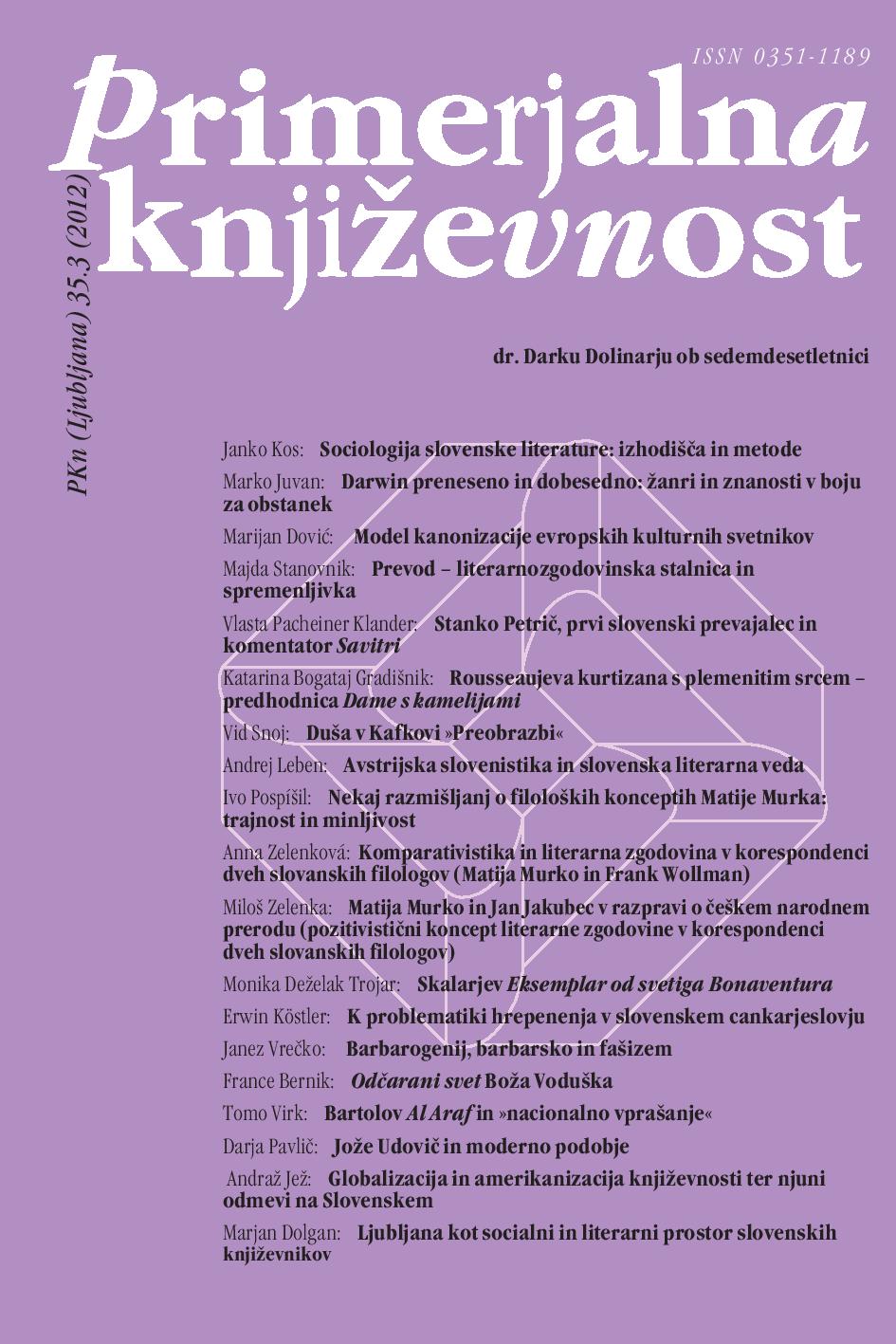The Barbarogenius, the Barbaric, and Fascism
Keywords:
literary avant-garde, constructivism, zenitism, barbarism, barbarogenius, literature and politics, fascism, Micić, Ljubomir, Kosovel, SrečkoAbstract
In his 1924 diaries, Kosovel first followed the idea of the zenithist barbarogenius because he connected it with broken-down European art and its revival with the help of the elementary and wild Balkans. The barbarogenius introduced by Ljubomir Micić was located in Serbia and in Russia. This was a destructive poetic phase in Kosovel’s life, which he described in his diaries as “dreams of nihilism”. Thus in his Diary II, one can find the syntagm “barbarically primitive artist-genius” as an opposition to “cultural person”. In his essay “Kriza človečanstva” (“The Crisis of Humanity”) he also understands Europe as “a madhouse of rational spirits”. – However, from April 1925 onwards, Kosovel accepted the concept of barbarianism outside futuristic, zenithist, and other contexts, and thus stopped defining it in terms of poetry studies and nationalism. With this he entered a constructivist phase in his life. The political fate of the Slovenians after the Treaty of Rapallo separated him from Micić’s blind glorification of Serbian barbarianism as a positive value for old and numb Europe. Kosovel did not conceive of barbarianism and the Balkans as going backwards and moving away from “dying Europe”, but as “returning to oneself”, to the ethnic and linguistic foundations and the rights of a small nation to liberate itself from the “black monster” (Kosovel, Zbrano 3 624). His concept of barbarianism thus remained within the sphere of politics and was closely connected with the changes following the First World War that fatally divided the Slovenian nation.References
Bajt, Drago. Ruski literarni avantgardizem. Ljubljana: DZS, 1985. (Literarni leksikon 27).
Batušić, Slavko. »Tridesetgodišnji dečak u gradu«. Forum: Časopis Razreda za suvremenu književnost Jugoslavanske akademije znanosti in umjetnosti 10.12 (1971): 785–812.
Flaker, Aleksandar. Nomadi ljepote: Intermedijalne studije. Zagreb: Grafički zavod Hrvatske, 1988.
Goll, Iwan. »Der Expressionismus stirbt«. Zenit 1.8 (1921): 8–9.
Hansen-Löve, Aage A. »Predmet-stvar-bez-predmetnost-postvarenje«. Pojmovnik ruske avangarde 8. Ur. Aleksandar Flaker in Dubravka Ugrešić. Zagreb: Grafički zavod Hrvatske in Zavod za znanost o književnosti Filozofskog fakulteta u Zagrebu, 1990. 9–55.
Kosovel, Srečko. Ikarjev sen: Dokumenti, rokopisi, pričevanja. Ur. Aleš Berger in Ludwig Hartinger. Ljubljana: Mladinska knjiga, 2004.
– – –. Integrali ’26. Ur. in uvod napisal Anton Ocvirk. Ljubljana: Cankarjeva založba, 1967; 1984 (2. izd.); 1995 (3. izd.).
– – –. Zbrano delo 2. Ur. Anton Ocvirk. Ljubljana: DZS, 1977.
– – –. Zbrano delo 3. Ur. Anton Ocvirk. Ljubljana: DZS, 1977.
Kralj, Lado. »Jaz sem barbar«. Primerjalna književnost 11.1 (1988): 29–41.
Micić, Ljubomir. Kola za spasavanje. Zagreb: Gaj, 1922. (Biblioteka Zenit).
– – –. »Moja poezija i javni moral: Prvostepenom sudu za varoš Beograd«. Zenit 6.39 (1926): 17–20.
– – –. »Nova umetnost«. Zenit 4.34 (1924): 2–5.
– – –. »Šimi na groblju latinske četvrti: Zenitistički Radio-Film od 17 sočinenija«. Zenit 2.12 (1922): 13–15.
– – –. »Za slobodu misli, za slobodu stvaranja«. Zenit 6.41 (1926): 5–12.
Micić, Ljubomir, Iwan Goll in Boško Tokin. Manifest zenitizma. Zagreb, 1921. (Biblioteka Zenit 1).
Vrečko, Janez. Srečko Kosovel: Monografija. Ljubljana: Založba ZRC, ZRC SAZU, 2011.


